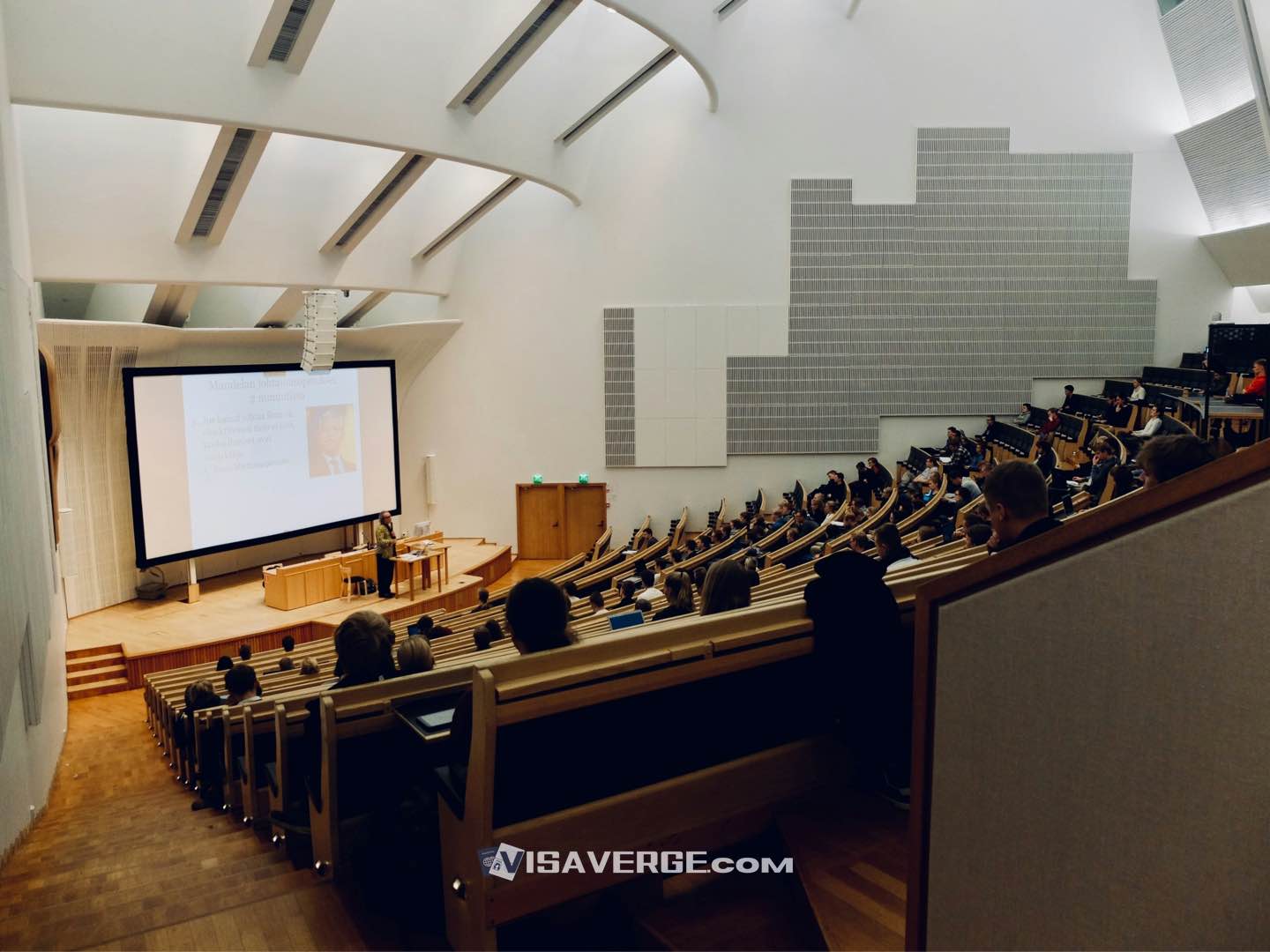Why Are Fewer Americans Choosing to Study in China?
Stephen Garrett, a 27-year-old graduate student at Johns Hopkins University, had his sights set on China for his higher studies. However, the restrictive COVID-19 policies adopted by the country during the pandemic made it nearly impossible for him to pursue education there. Even after China reopened, Stephen noticed a significant decrease in interest among fellow scholars regarding studying in China. Common apprehensions cited include restrictions on academic freedom and the overwhelming risk of being stranded amidst escalating tensions between Washington and Beijing. Stephen lays bare that not just him but many of his peers now see diminishing economic opportunities in China, contributing to their reluctance.

What Has Caused the Decline in American Students Studying in China?
A decade ago, nearly 25,000 American students were studying in China. This number has drastically fallen to around 700 today. According to Nicholas Burns, the U.S. ambassador to China, this number is “far too few in a country of such importance to the United States.” Both countries are at a juncture where increased mutual understanding is crucial, yet the gaping discrepancy in student exchange numbers is alarming. Deputy Secretary of State Kurt Campbell pointed out that the current environment might not be as conducive for educational exchanges as in the past. The U.S. has issued travel advisories advising citizens to “reconsider travel” to China due to fears of arbitrary detentions and the application of exit bans. This has undoubtedly affected the willingness of students to pursue education in China.
How Are Both Countries Working to Encourage Student Exchanges?
Despite the fraying US-China relations, officials from both sides agree more should be done to bolster student exchanges. Initiatives are underway to rebuild these bridges. Chinese President Xi Jinping, understanding the value of intercultural exchange, has invited thousands of U.S. high school students to visit China. This move is reminiscent of efforts like President Barack Obama’s 100,000 Strong initiative started in 2009, aiming to boost the number of US students in China.
In addition, Beijing is working on reestablishing programs for international students that had halted during the pandemic. The measures include possibly easing strict laws and creating conducive conditions for foreign students, allowing integration and cultural immersion to be smoother.
Why Is Studying in China Important for American Students?
Studying abroad, particularly in a pivotal nation like China, offers American students a firsthand understanding of a significant global player on the political and economic fronts. American linguist David Moser, who is now assisting in setting up a new master’s program at Beijing Capital Normal University emphasized, “In the next decade, we won’t be able to exercise savvy, knowledgeable diplomacy in China without these cultural exchanges.”
Learning Mandarin and experiencing life in China firsthand equips American students with critical skills and understandings that are vital in an increasingly interconnected world. Ambassador Burns sums it up perfectly: “We need young Americans to learn Mandarin. We need young Americans to have an experience of China.”
What Are the Experiences of Students Currently Studying in China?
Chris Hankin, a 28-year-old master’s student focusing on international relations with a focus on energy and the environment at the Hopkins-Nanjing center, believes his time in China is irreplaceable. He emphasizes the importance of direct interaction with ordinary people and exploring places beyond the international spotlight, which adds depth to his understanding of US-China relations.
Meanwhile, Jonathan Zhang, a student at the prestigious Schwarzman Scholars program at Tsinghua University in Beijing, argues that being in China offers a critical perspective that is hard to gain otherwise. Zhang, who deferred a consulting firm offer to study in Beijing, encounters concerns for his safety back home, highlighting the nuanced perceptions and sometimes misunderstandings that exist regarding studying in China.
For more information on studying in China and how it can shape your global perspective, visit The U.S. Bureau of Educational and Cultural Affairs.
Why Should U.S. Universities Encourage More Students to Study in China?
Universities play a crucial role in shaping the perspectives of future leaders. Amy Gadsden, executive director of China Initiatives at the University of Pennsylvania, believes that “we need to be more intentional about creating opportunities and encouraging students to do this deeper work on China.” This encouragement could pave the way for a more nuanced understanding and foster a richer, more informed dialogue between the next generation of leaders from both the U.S. and China.
Through revitalizing programs, strengthening diplomatic ties, and fostering an environment of cultural and educational exchange, there remains a hopeful horizon. Mindful engagement and enhanced mutual understanding could potentially transform the current challenges into a dynamic opportunity for growth and collaboration between the U.S. and China.
Learn Today:
1. Academic Freedom
– Definition: The freedom of teachers and students to express their ideas and beliefs without fear of governmental or institutional restrictions. Concerns about academic freedom can affect decisions about where to study internationally, as seen in American students’ apprehensions about studying in China.
2. Exit Bans
– Definition: Measures used by a country to prohibit individuals from leaving its territory. These can be used against foreign nationals to exert legal pressure or as retaliatory acts in diplomatic disputes. The U.S. has issued travel advisories related to exit bans in China, influencing American students’ decisions regarding studying there.
3. Travel Advisories
– Definition: Official government statements that provide information and advice on the safety and security of traveling to specific countries. These advisories can impact international educational exchanges by warning potential travelers of risks such as arbitrary detentions.
4. Arbitrary Detentions
– Definition: The practice of detaining individuals without due cause or legal process. This can be a concern for students studying abroad in countries where legal processes are not transparent or are influenced by diplomatic tensions.
5. Cultural Immersion
– Definition: The process by which an individual gains an understanding of and adapulates to the cultural environment of another country, typically by living within that community. Programs promoting cultural immersion are essential in educational exchanges and can aid students in gaining a more profound understanding of their host country.
6. Intercultural Exchange
– Definition: The mutual exchange of ideas, values, norms, and other cultural elements between people from different cultural backgrounds. Intercultural exchanges, such as student educational visits and exchanges, can enhance diplomatic relations and increase mutual understanding.
7. Conducive Conditions
– Definition: Circumstances or environments that are favorable or beneficial. In the context of international education, this refers to the creation of supportive policies and environments that facilitate learning and cultural exchange for foreign students.
8. Linguistic Skills
– Definition: The abilities involved in learning and using a language other than one’s mother tongue. For American students in China, acquiring Mandarin skills is viewed as crucial for engaging effectively in diplomatic and cultural interactions.
9. Educational Exchange Programs
– Definition: Formal programs that allow students to study abroad, providing them with an opportunity to learn in a different cultural and educational setting while fostering international relationships. These programs may be bilateral or multilateral and often receive governmental support.
10. Revitalizing Programs
– Definition: Initiatives aimed at rejuvenating or enhancing existing programs to meet current educational and diplomatic needs. In the context of U.S.-China relations, efforts are being made to revive and strengthen educational exchange programs that were impacted by the COVID-19 pandemic and geopolitical tensions.
These terms provide foundational knowledge to understand the complexities and benefits of international study programs, especially in a sensitive diplomatic context such as that between the U.S. and China.
This Article In A Nutshell:
Amid declining U.S. student interest in China due to COVID-19, tensions, and safety concerns, efforts are underway to revitalize educational exchanges. Understanding China is critical for American students in a globalized world. Cultivating mutual understanding through cultural immersion can pave the way for improved relations and enrich future leadership perspectives.
— By VisaVerge.com
Read more:
-
China’s Immigration Service Platform Reaches 10 Million Call Milestone
Explore how China’s dedicated immigration service platform has achieved a significant milestone in user engagement. -
Tragic News: Chinese Student Found Dead Near Maine Campus
Read about the unfortunate discovery of Qingyang Zhan, a student from China, near his college campus in Maine. -
China Issues Travel Advisory to Its Citizens for U.S. Visits
Find out the details behind the travel advisory issued by China for its citizens traveling to the United States. -
Enhancing US-China Educational Relations: 50,000 Students to Study Abroad
Discover the ambitious plan to boost educational ties between the U.S. and China, allowing 50,000 students to study abroad.








